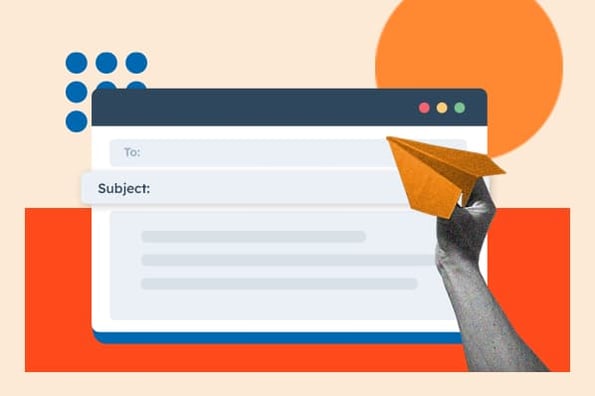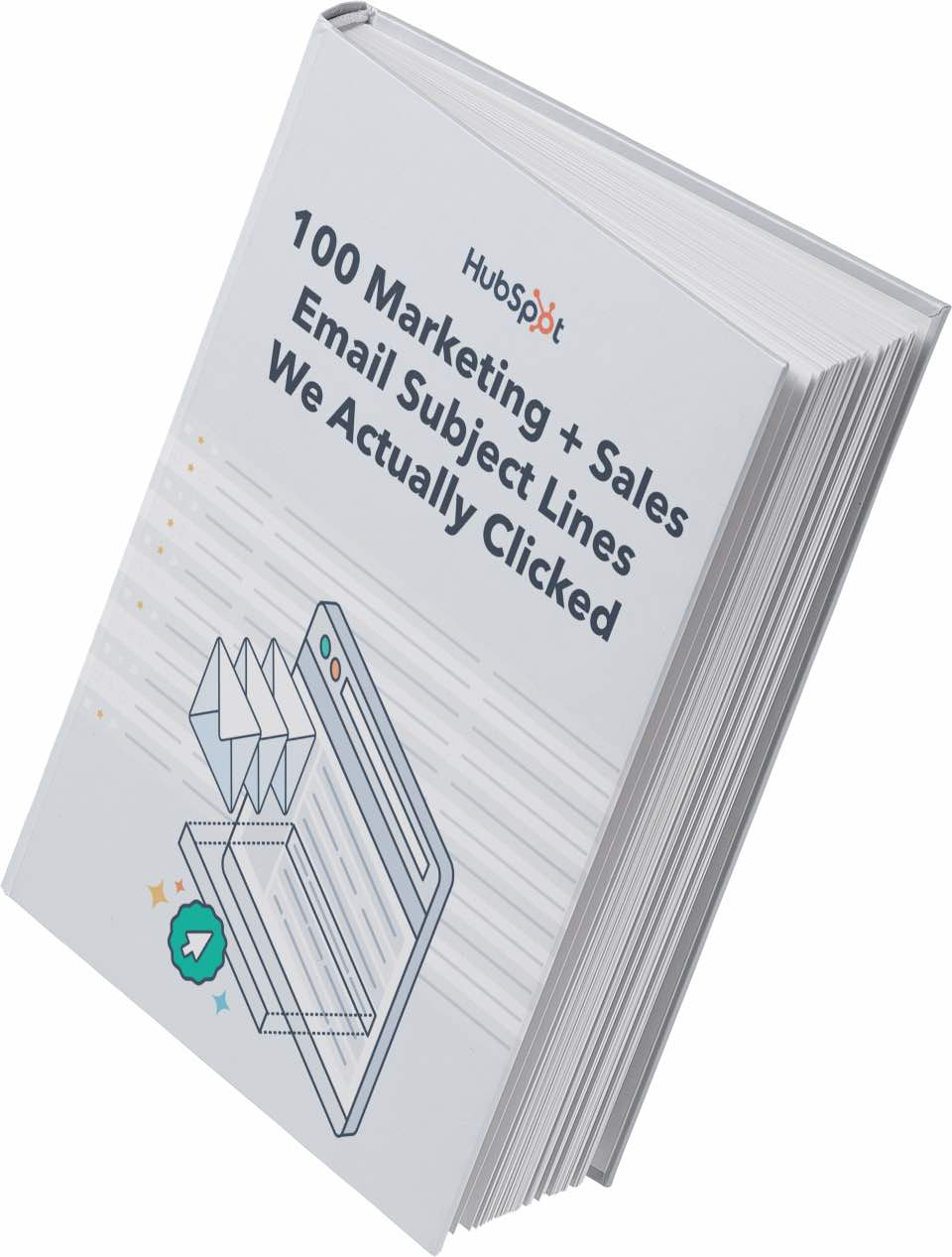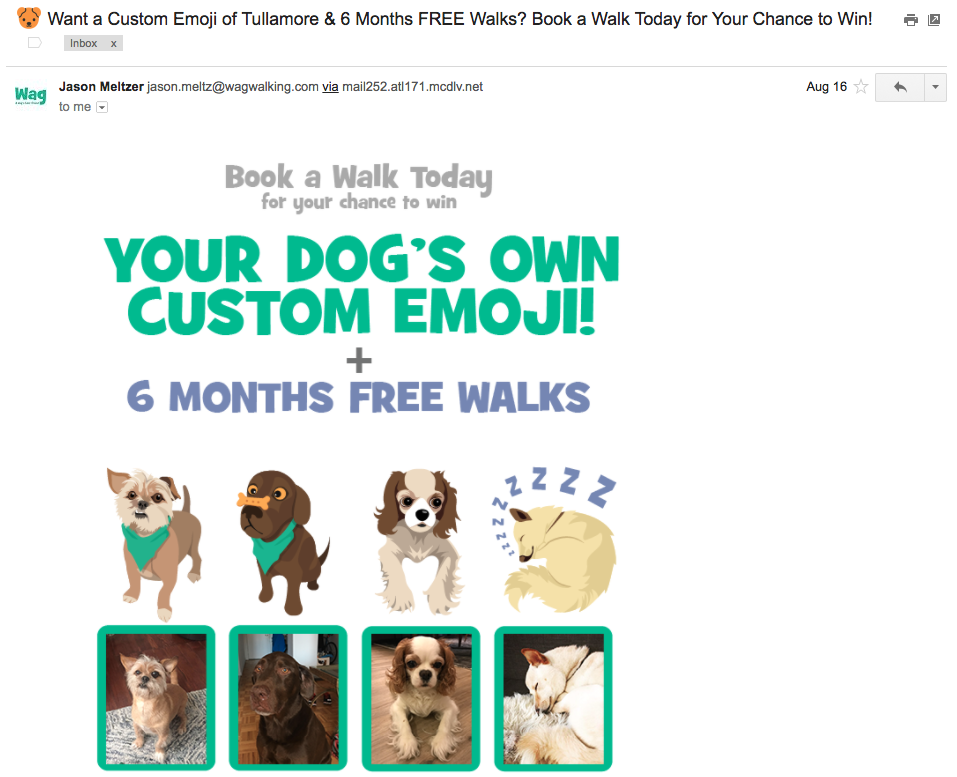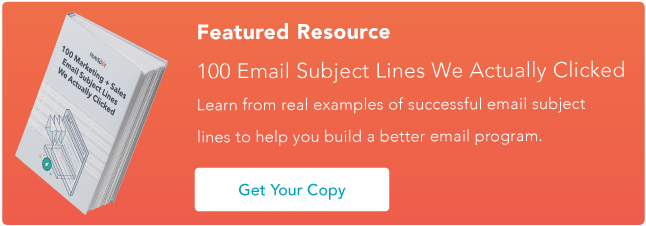Your readers are judging your email subject lines. In fact, 47% of marketers in 2022 say they test different email subject lines to optimize their emails’ performance and increase click-through rates.
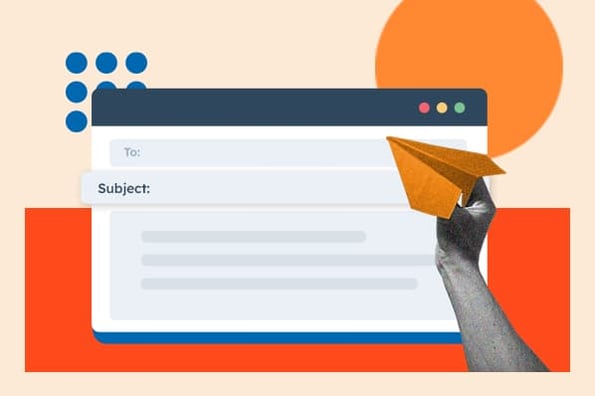
While subject lines may seem like an insignificant part of your message, they are often your only chance to stand out in a crowded inbox. Read on for some tried-and-true tips to help jazz up your subject lines and boost your email engagement.
What makes a good email subject line?
Before we get to our tips, let’s go over some fundamentals of what makes a great subject line. Regardless of your goals, these are the essential elements that your subject line should possess.
1. Urgency
.png) Creating a sense of urgency is an efficient way to get people to take action. Subject lines that use words like “urgent,” “breaking,” “important,” or “alert” have higher open rates.
Creating a sense of urgency is an efficient way to get people to take action. Subject lines that use words like “urgent,” “breaking,” “important,” or “alert” have higher open rates.
By communicating a known start and end date for a special sale or promotion, viewers scrolling through their inbox will click to see what they can get in that window of time.
This is a best practice when done in a series of emails counting down the window of opportunity — as long as you’re not flooding their inbox, which comes off as spammy.
You can also create urgency for webinars or content by making them ungated for a specified amount of time, then giving your viewers codes or temporary access to the content.
2. Curiosity
.png) Subject lines sometimes work because they can send the message, “You will benefit from opening this email.” But other times, it’s good to maintain some mystery — especially if it piques the recipient’s natural curiosity and interest.
Subject lines sometimes work because they can send the message, “You will benefit from opening this email.” But other times, it’s good to maintain some mystery — especially if it piques the recipient’s natural curiosity and interest.
Because they require opening the email to get more information, they can result in a higher open rate. But make sure the subject line, while enigmatic, still aligns with your brand. Too obscure, and it could end up being seen as spam.
3. Offers
-Jun-02-2023-07-31-56-6907-PM.png) Here’s where the benefit of opening a given email comes in. At the end of the day, people love new things and experiences — especially when they’re free or at least discounted. Open with that by including it in your subject line.
Here’s where the benefit of opening a given email comes in. At the end of the day, people love new things and experiences — especially when they’re free or at least discounted. Open with that by including it in your subject line.
Personally, I’m much more inclined to open my daily newsletters when there’s an offer or allusion for “free stuff” directly mentioned in my inbox.
4. Personalization
No two email subscribers are the same. Sometimes, that means the emails you send to them shouldn’t be, either. At this point, marketers have never had more ways to learn about their subscribers’ preferences, jobs, or general (dis)likes.
So when you send them content, on occasion, make it catered toward the individual.
5. Relevance and Timeliness
When we subscribe to an email list, it’s typically because we want to be kept informed or learn more about a given topic (more on that later).
Similar to piquing your audience’s curiosity, crafting email subject lines that incorporate trending topics or timely headlines can help you establish your brand as an authority within your industry — and can compel people to click to read.
6. Name Recognition
.png) Let’s face it: We all have famous people who we presently or previously have admired.
Let’s face it: We all have famous people who we presently or previously have admired.
When you understand your audience’s preferences, you can pique their interest by including the names of these recognizable individuals in your content — and mentioning them in your email subject lines.
But take heed: This tactic only works when it aligns with your brand, product, or service. So keep it relevant rather than just throwing out a name for the sake of recognition.
7. Cool Stories
At the risk of sounding like a broken record, here’s another place where curiosity comes into play.
By front-loading your email subject line with a compelling allusion to a story — but can only be read if opened or clicked — your audience is likely to become intrigued and want to learn more.
Again, make sure the story is relevant to your brand. Otherwise, it can confuse your readers and prevent them from opening the email.
8. Length
While shorter is usually better, Gartner reports that “longer, more detailed subject lines with more than 70 characters perform as competitively as those with 11 to 20 characters.”
This is due to how you segment your audiences, so don’t be afraid to A/B test how long your ideal subject line should be.
Now that you know the fundamentals, let’s dive into email subject line best practices.
Email Subject Line Best Practices
1. Learn from successful email subject line examples.
We often look to examples for inspiration whenever we’re scratching our heads, wondering what to make our subject line.
Seeing clever use of wordplay or emojis on one of our favorite newsletters can help us think of new ways to approach our subject line.
To help you do the same, we’ve compiled a list of 100 email subject lines from real businesses. We hope you’ll be just as inspired.
Download the Free Email Subject Lines Examples Guide
2. Get to the point.
Email subject lines will get cut off if they’re too long, particularly on mobile devices. And with up to 46% of email opens taking place on mobile, we recommend using subject lines with fewer than 50 characters to make sure the people scanning your emails read the entire message.
If you’re struggling to keep your subject lines short, think about which words matter less and where you can remove a frivolous detail. For example, if you’re sending an order confirmation, doesn’t “Your order is being processed” look better than “Order #9435893458358 is being processed”?
The same goes for your regular emails: Don’t waste your time including the word “update” or “newsletter” in the subject. Some studies suggest these words can decrease your open rate. This language tells readers the email is one in a series, and therefore, they can catch the next one.
3. Use a familiar sender name.
That name recognition we mentioned earlier doesn’t just apply to the famous — it applies to the familiar.
When setting your sender name, be as human as you can. Olivia@yourcompany.com is both inviting and unintimidating to people when they open their inboxes.
If you’ve already met your recipients from a previous conversation, use your own name as the sender’s address — even if the email is technically coming from the company as a whole.
The best impression you can make on your customers is that they’re working with you, the individual.
“If the ‘from’ name doesn’t sound like it’s from someone you want to hear from, it doesn’t matter what the subject line is,” explains Copy Hacker‘s Joanna Wiebe.
Ultimately, people are busy. They simply don’t bother if you don’t sound like someone who would make for an easy (or at least friendly) conversation.
4. Avoid the ‘no-reply’ sender name.
Thanks to the amount of spam people get, most people hesitate to open emails from unfamiliar senders. Even fewer people enjoy talking to a robot. Think about when you call a company and can’t get a hold of an actual person.
It’s frustrating, right? This is the same for email.
Never use “noreply@company.com.” Not only does it make it look less personable, but it also stops people from adding your email to their address book.
Instead, avoid using a generic email address and send the email from a real person.
For instance, we once found that emails sent from “Maggie Georgieva, HubSpot” performed better in terms of opens and click-through rate than emails sent from just “HubSpot.”
(HubSpot customers: Learn how to personalize the “From” name and email address here.)
5. Use personalization tokens.
Remember the personalization we mentioned earlier? Using personalization tokens — like name or location — in the subject line adds a feeling of rapport, especially when it’s a name.
Everyone loves the sound of their own name. Plus, it increases click-through rate: Research has shown that emails that included the recipient’s first name in their subject line had higher click-through rates than emails that did not.
One example of how brands affix this information to subject lines is the dog-walking company Wag!, which does this with dog names. Here’s one such email that a HubSpot writer received:
That’s great personalization and great timing.
Another personalization tactic that works is to tailor subject lines to the recipient’s location — things like lists of their respective cities’ best outdoor bars and restaurants.
Little personalized touches show that you know more about your recipient than just their email address.
However, if you can’t (or don’t want to) use personalization tokens in the subject line, use “you” or “your,” so it still sounds like you’re addressing them directly.
Just don’t go overboard with the personalization here. That can be a little creepy.
6. Segment your lists.
While email blasts that go out to your entire list might be relevant and helpful to some people, they won’t be to others — causing confusion and frustration.
Why is this restaurant sending me a list of the best local steakhouses when I’m a vegetarian? Why is this company sending me case studies when I just signed up for its email list yesterday?
Personalize the experience using information from the actions your customers have already taken — from which forms they’ve filled out, to which industries they’re in, to what their personal preferences are.
In email marketing, you can personalize your recipients’ experience using a little thing called list segmentation.
7. Use AI to get personal.
Bank of America uses AI and questionnaires to personalize both subject lines and email content.
By targeting their lists with subject lines they believed would interest them, Bank of America gained a 26% year-over-year digital sales growth in the second quarter of 2021.
Implementing AI in your subject lines may look like adaptive testing.
Adaptive testing identifies variations in traffic/open rates and adjusts the traffic automatically, so that better-performing variations are shown more and poorer-performing variations are shown less.
Check out this article on how you can use AI to optimize your content.
8. Don’t make false promises.
Your email subject line is making a promise to your reader about what you will deliver in your message. Make sure that you make good on that commitment — and do not try to get your email opened by making false promises.
This will irk your audience, and they’ll learn not to trust your subject lines, resulting in a lower open rate and a higher unsubscribe rate.
9. Do tell them what’s inside.
Alt: email subject line, Hey Kaitlin, your download is ready!
IMG name: whats-inside
Speaking of making promises, if your visitor has downloaded an offer and you’re delivering it via email, it’s a great idea to use a subject line that says something like, “Your new ebook inside!” or, “Your guide awaits!”
This works better than a simple “thank you” in the subject line because it makes it clear that something is waiting inside the email.
10. Time it right.
Sending an email at the right time with the right subject line can make a huge difference in open and click-through rates.
A prime example? When food publication Eater sent an email at 6:45 P.M. on a Wednesday evening that said, “Where to Drink Beer Right Now” — it was just in time for happy hour. Nailed it.
The day of the week matters as well. Fridays see the highest email open rates (nearly 19%), compared to the lowest open rates (17%) on Saturdays.
Another favorite example is a classic email from Warby Parker with the subject line, “Uh-oh, your prescription is expiring.” It was sent two weeks before the recipient needed to renew his prescription.
By sending an email at the right time, Warby Parker increased the chances of their email getting opened — and included a relevant call-to-action about getting a glasses upgrade, too.
11. Use concise language.
Keep in mind that people scan their inboxes very quickly — so the more clear and concise your subject line is, the better.
It’s usually a lot better to be concise than it is to use complex and flowery language — unless you’re going for an elusive subject tone to entice your recipients.
When you’re going for a concise subject line, think about how your email will benefit your recipients.
You’ll want to make that benefit very clear. For example, “Increase your open rates by 50% today” is more appealing than “How to increase open rates.”
If your subject line needs to be longer, just make sure it is relevant because “marketers who are sending targeted emails can send longer subject lines if it includes relevant insights for the customer” (Gartner).
12. Start with action-oriented verbs.
Subject lines are similar to calls-to-action in that you want the language to inspire people to click.
Subject lines that begin with action verbs tend to be a lot more enticing, and your emails could be drastically more clickable by adding a vibrant verb at the beginning.
Actionable subject lines will inspire people to click on your email by instilling urgency and excitement.
For example, in an email inviting people to a hockey legend dinner, the email subject line might read, “Dine with Bruins legend Bobby Orr,” rather than a more generic “Local Boston Sports Legend Meal.”
The former email uses “dine” to help the reader envision themselves at the table.
13. Make people feel special.
The psychology of exclusivity is a powerful thing. When people feel like they’re on the inside, it gives them a sense of belonging which builds loyalty and compels them to convert on your emails.
The right phrasing can make your recipients feel special — and the effect can be magical. A few ideas for phrasing include:
- “For our beloved customers only…”
- “An exclusive offer for you…”
- “My gift to you…”
- “You’re invited!”
- “Private invite…”
14. Create a sense of importance.
For many of us, there’s a phrase reminiscent of classic infomercials: “Act now!”
And while we wouldn’t encourage using that exact language in your content, we agree that communicating urgency and scarcity in an email subject line can help compel readers to click (or act) — when phrased creatively and strategically.
But because you don’t want to be known as “the brand that cried wolf,” use these subject lines sparingly, and try to limit them to when the occasion genuinely calls for immediate action.
15. Use numbers.
Many businesses send emails with vague statements in their subject lines — which is why using data and numbers is a great way to get your emails noticed, demonstrate a clear and straightforward message about your offer, and set the right expectations.
Just like with blog titles, using numbers in your subject line is an effective email marketing best practice.
You might use numbers to refer to the title of your listicle, the page length of an offer, a specific discount, or the numerical benefit of a particular resource you’re providing — like “Join more than 750 others at this event!”
16. Pose a compelling question.
Asking a question in your subject line can also draw readers in — especially if you’re asking a question you know is relevant to your recipients’ buyer persona. This is just one way to pique that curiosity we mentioned earlier.
For example, you might try the following: “Are you making these SEO mistakes?” or “Do you know what your website is doing wrong?”
Zillow once sent an email with the subject line, “What Can You Afford?” that linked to a website showing apartments for rent.
A subject line like this is both encouraging and a touch competitive: While it gives hope that there are apartments out there that’ll fit within your budget, it also pits your cash against what the market offers.
Another example comes from DocuSign. It sent an email late in the lead nurturing process with the subject line, “What are your customers saying?”
The body of the email contained a bunch of case studies meant to help the recipient move closer to actually purchasing DocuSign.
This was a smart move: Folks further down the funnel are likely more receptive to customer testimonials.
17. Don’t be afraid to get punny.
Most people love a good pun. It’s a great way to delight your recipients and spice up your emails. Some of the best punny email subject lines come from JetBlue, with subject lines like “Land wander-ful low fares now!”
Quirky — a community-led invention platform — worded one of its email subject lines like this: “Abra-cord-abra! Yeah, we said it.” That second part is conversational and self-referential — exactly what most people would say after making a cheesy joke in real life.
If you’re the least bit punny, think about small ways to slip them into your emails when appropriate. Just don’t overdo it. And remember the rule: When in doubt, ask a coworker.
18. DON’T USE ALL CAPS or overuse exclamation points!!!
A subject line that says, “OPEN NOW AND RECEIVE A FREE TRIAL” or, “50% off coupon today only!!!!!!!!” isn’t going to get your email opened. If anything, it’ll probably get your email ignored.
Why? People don’t like to be yelled at, and using all caps and/or a lot of exclamation points can rub people the wrong way.
Not only are these tactics disruptive, but they look spammy. So instead of using disruptive tactics like these to stand out in people’s inboxes, try personalizing your emails, establishing relevance, and using catchy and delightful language.
19. Don’t include a question and exclamation in the same subject line.
Here’s a subject line that can automatically wind up in a recipient’s spam folder: “Want a solution fast? Act now!”
The fast solution isn’t the problem in the example above. It’s also not “act now” — although those are known email marketing spam words. It’s both phrases together.
This is a classic email saboteur, and it comes in many forms. All you need is to ask and yell at the same time.
Often, web servers flag emails as spam if they contain both a question mark and an exclamation mark in the subject line. The example above is a common one. A good solution? Don’t do that!
Not only is this format overdone, but it’s alienating to your audience. Open-ended questions show ignorance; any good marketer knows their leads better than that.
20. Use engaging preview text.
While preview text isn’t technically part of your subject line, it appears right near the subject line and certainly deserves your attention.
Preview text gives recipients a peek at the content inside your email, which clients like the iPhone Mail app, Gmail, and Outlook will display alongside the subject line. (The exact amount of text shown depends on the email client and user settings.)
When you don’t set the preview text yourself, the email client will automatically pull from the body of your email. That can look messy depending on your email content, and it’s also a wasted opportunity to engage your audience.
(HubSpot customers: Click here to learn how to set the preview text of your emails.)
21. A/B test your subject lines.
Although these tips and best practices are a great place to start, what works best for some companies may not work as well for others. It’s all about figuring out what works best for your specific audience. That’s where A/B testing comes in.
While it can be tempting to use your intuition to predict what subject line language will make people click on your emails, you should always A/B test your highest-stakes subject lines and tweak the wording according to your results.
What works best for your audience: Long or short subject lines? Including numbers or not including numbers? Questions or statements? (HubSpot customers: Learn how to A/B test emails in HubSpot here.)
22. Reach out again.
A common problem in email marketing is sometimes, despite your best efforts, readers simply don’t open your emails. However, current stats demonstrate that marketers are missing out on further engagement.
Retargeting emails yield an 11% open rate lift on average, making them a profitable way to reach customers.
When retargeting, make this known in your subject line with something like “Oops, looks like you missed this!” or “Don’t forget to sign-up for this Friday’s webinar” or whatever you’d like a missed target to acknowledge.
Now that we’ve gone through our best practices, let’s review the steps to creating good email subject lines.
How to Write Good Email Subject Lines
Step 1: Identify the purpose of the email.
Why is the email being sent, and how does that inform the subject line? Identify the true purpose or intention of the email and use that as the foundation to build upon when brainstorming your subject line idea.
Step 2: Determine the call to action.
What will make the user click on the email? A discount? Something free? Important information? What is enticing enough to make them want to see or learn more about your offer?
Having a call to action with an incentive yet to be seen is tempting.
Step 3: Make it relevant.
Why should your reader open this particular email? Consider making your email time-sensitive or unique with a date or time-limited promotion.
Step 4: Draft multiple subject lines.
Write similar subject lines that use varying words and tones. You want to have a few ideas to choose from, so you’re not stuck stewing over the same sentence for too long.
Step 5: Get feedback.
Have colleagues review the subject lines to give their feedback on which they prefer. Having a second opinion can help you see it from a different perspective.
Step 6: Test your subject line.
As mentioned earlier, perform an A/B test to see which subject line performs best. After you’ve conducted the test, take the most effective email subject line and use it in your upcoming email marketing campaign.
Now that we’ve gone through the steps to create a good subject line, let’s examine some effective examples.
Examples of Catchy Email Subject Lines
To give you some added inspiration, here’s a quick list of the most intriguing subject lines we’ve seen recently.
EF Tours: “👻 Trip or Treat!”
This subject line from EF Tours uses a quirky emoji, coupled with a sense of urgency from a time-bound sale. These two tricks create an email subject line that would stand out from the rest of your inbox.
Chanel: “Smoldering Red Lipstick”
This example from Chanel is simple but effective. Viewers can visualize a beautiful red lip and feel enticed to click to see if the product really achieves a “smoldering” look.
Wish: “Electrify your night out.”
Wish helps the reader to see how much more fun their night could be in one of its dresses. With this imagery, they’ll want to see how fun their selection of dresses could be — especially if it’s discounted.
Drizly: “…here’s $5 to stay in.”
This subject line is more unique than others — it’s likely making a timely reference to weather conditions outside. This explicitly gives you an incentive to open the email.
Shutterfly: “Claim your UNLIMITED free photo book”
While we mentioned earlier to be careful with CAPS lettering, it doesn’t overwhelm this Shutterfly subject line and makes an interesting offer.
Mediabistro: “Generous PTO and Summer Fridays”
The viewer can envision themselves taking advantage of work perks like these from Mediabistro and will feel inclined to read more on the subjects presented.
Catch more clicks with catchy subject lines.
At the end of the day, if your emails aren’t getting opened, they’re not getting seen. By using some of our tips, we hope you can come up with creative and engaging subject lines of your own. You already have great content to share — now, prove it in your subject line.
Editor’s Note: This blog post was originally published in July 2018 but has been updated for comprehensiveness.

